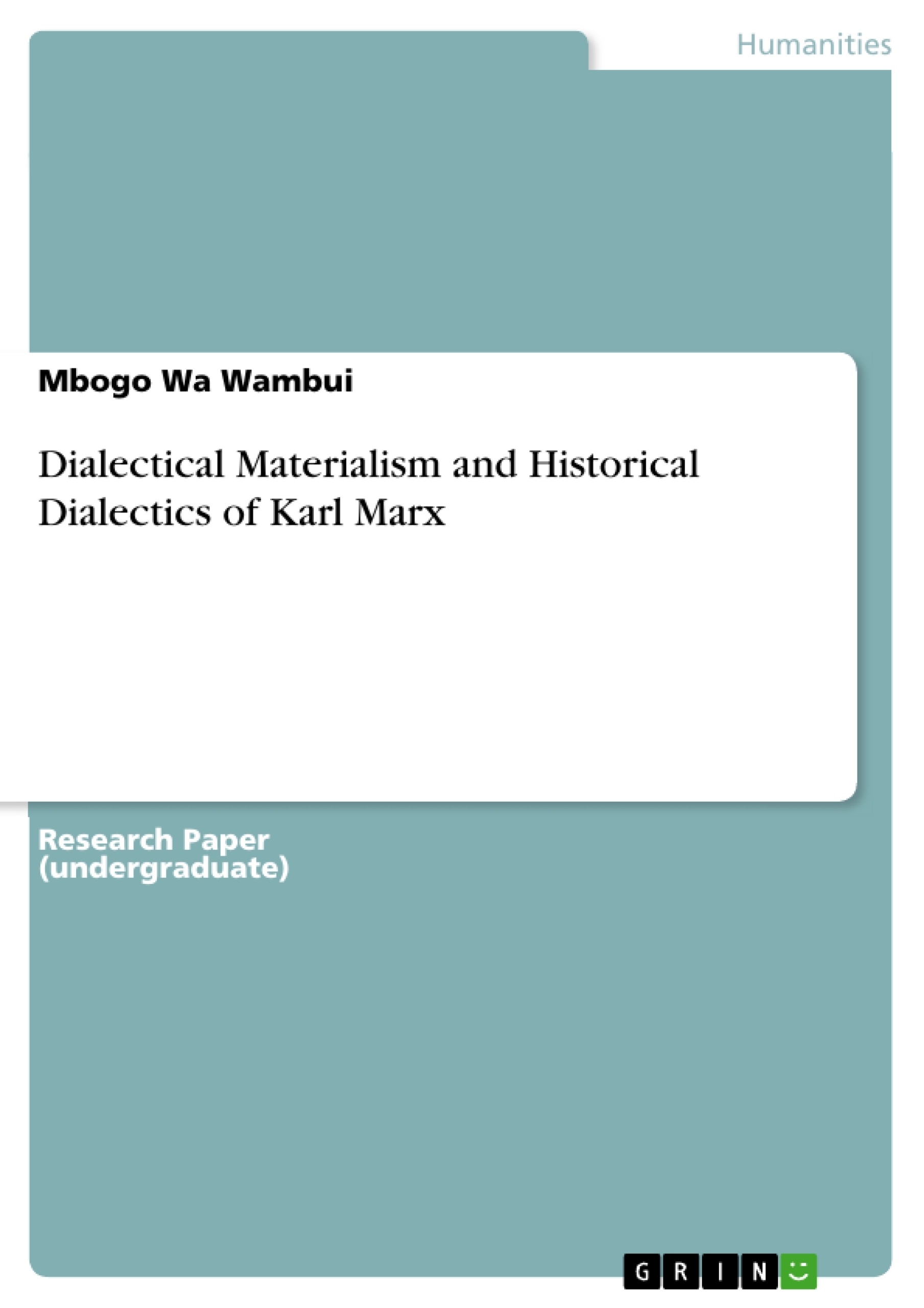This paper seeks to explain Karl Marx’s dialectical materialism and historical dialectics.
The stimulus of the work of Marx was the hope of a social revolution in his lifetime or in the future. Unlike British classical economics who aimed at the welfare of the capitalists, Marx worked to represent the interest of the wage earner. This is best represented in the "Communist Manifesto" of 1848. Marx called himself a materialist, though under Hegelian influence.
In 1843, he went to France to study socialism. There, he met Engels, the manager of a factory in Manchester. From him, he came to know of English labour conditions and English economics. After taking part in the French and German revolutions of 1848, he sought refuge in England in 1849 from where he wrote and amassed knowledge.
Table of Contents
- Introduction
- Marx on Dialectical Materialism
- Marx on Historical Dialectics and Materialism
- Conclusion
Objectives and Key Themes
This paper aims to explain Karl Marx's dialectical materialism and historical dialectics, tracing their development and influence. It explores Marx's intellectual journey, highlighting his engagement with Hegelian philosophy and his development of a materialist interpretation of history.
- The Hegelian dialectic and its influence on Marx's thought.
- Marx's concept of dialectical materialism.
- Marx's theory of historical materialism.
- The relationship between Marx's materialism and his theory of history.
- Marx's critique of classical economics and his focus on the interests of the wage earner.
Chapter Summaries
Introduction: This introductory section provides biographical context for Karl Marx, highlighting his early life, education, and influences. It emphasizes his exposure to Hegelianism, his journalistic endeavors, and his involvement in revolutionary movements. The introduction sets the stage for the paper by establishing Marx's intellectual trajectory and his eventual commitment to a materialist understanding of history and society, culminating in his critique of capitalism and advocacy for the working class. It lays the groundwork for understanding the central themes of dialectical and historical materialism, which will be explored in detail in subsequent sections.
Marx on Dialectical Materialism: This chapter defines dialectical materialism, unpacking both the dialectical and materialist aspects. It explains the dialectic as a process of thesis, antithesis, and synthesis, drawing upon Hegelian philosophy but emphasizing a materialist basis. Materialism, in Marx's view, asserts that material conditions are the foundation of historical and political events. The chapter likely contrasts Marx's approach with other philosophical schools of thought, and it could also discuss how Marx's understanding of materialism differs from others.
Marx on Historical Dialectics and Materialism: This section delves into Marx's theory of historical materialism, explaining how his dialectical method is applied to historical analysis. It likely explores the role of class struggle, economic forces, and material conditions in shaping historical processes. This section will likely connect the concept of labor as a central element in the formation of societal structures and the evolution of consciousness. The relationship between Marx's theory of self-consciousness and his materialist conception of history will be a key aspect of this chapter. It will explore how social relationships and collective activity shape individual identities.
Keywords
Dialectical materialism, historical materialism, Hegelian dialectic, class struggle, materialism, labor, social relations, history, political economy, capitalism.
Frequently Asked Questions: A Comprehensive Language Preview
What is the purpose of this document?
This document provides a comprehensive preview of a text focusing on Karl Marx's dialectical and historical materialism. It includes the table of contents, objectives, key themes, chapter summaries, and keywords.
What topics are covered in the text?
The text explores Karl Marx's dialectical materialism and historical dialectics, tracing their development and influence. It examines Marx's engagement with Hegelian philosophy, his materialist interpretation of history, his critique of classical economics, and his focus on the interests of the wage earner.
What are the key themes explored in the text?
Key themes include the Hegelian dialectic's influence on Marx's thought; Marx's concepts of dialectical and historical materialism; the relationship between Marx's materialism and his theory of history; and Marx's critique of classical economics and focus on the interests of wage earners. The role of class struggle, economic forces, and material conditions in shaping historical processes are also central.
What is the structure of the text?
The text is structured into chapters including an introduction, a section on Marx's dialectical materialism, a section on Marx's historical dialectics and materialism, and a conclusion. The introduction provides biographical context for Marx. The subsequent chapters delve into the theoretical aspects of Marx's thought.
What is Marx's dialectical materialism?
Marx's dialectical materialism combines Hegel's dialectical method (thesis, antithesis, synthesis) with a materialist perspective. It asserts that material conditions (economic structures, etc.) are the foundation of historical and political events, not ideas.
What is Marx's historical materialism?
Marx's historical materialism applies the dialectical method to historical analysis. It emphasizes the role of class struggle, economic forces, and material conditions in shaping historical processes. It connects labor as a central element in societal structure and the evolution of consciousness.
What is the relationship between Marx's dialectical and historical materialism?
Marx's historical materialism is the application of his dialectical materialism to history. The dialectical process of thesis, antithesis, and synthesis is used to understand the evolution of historical events, driven by material conditions and class struggle.
What are the keywords associated with the text?
Keywords include: Dialectical materialism, historical materialism, Hegelian dialectic, class struggle, materialism, labor, social relations, history, political economy, and capitalism.
Who is the intended audience of this text?
The intended audience is likely academic, given the focus on theoretical analysis and the structured presentation of information for scholarly examination.
- Citation du texte
- Mbogo Wa Wambui (Auteur), 2011, Dialectical Materialism and Historical Dialectics of Karl Marx, Munich, GRIN Verlag, https://www.grin.com/document/703506



